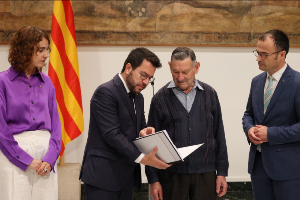- Today, the head of the Government has delivered the Interdisciplinary Report for the identification of the remains of the anti-Francoist militant Cipriano Martos to his family
- Aragonès defends continuing with the democratic memory policies and “opening graves to close wounds” because “they wanted the victims to be forgotten, but we will not do that”

The President of the Generalitat, Pere Aragonès, has delivered the Interdisciplinary Report for the identification of the remains of the anti-Francoist militant Cipriano Martos to his family. With this act, said the head of the Government, “we do justice” and “we allow the Martos family to regain their dignity and peace.” Aragonés added that “in Catalonia there are 20,000 people buried in almost 900 identified graves, most of them soldiers in retreat, fighters for freedom and democracy, who await justice and dignity, and restoring their memory is our duty as a country, as a society and as people.” The head of the Catalan Government presented the Report to Cipriano’s brother, Antonio Martos, in a ceremony at the Palau de la Generalitat.
For Pere Aragonès, the Government’s aim in pursuing the public policy of democratic memory over recent years has been to “open graves to close wounds,” and “to restore the memory” of all those people “who were killed and buried any old way, who were left without names, without history, to be forgotten, but we will not do that.” The Executive “will continue its work for the recovery of democratic memory with strong conviction, following the principles of truth, justice, reparation and guarantees of non-recidivism.”
The President remarked how the Generalitat “has been a pioneer” in many areas of democratic memory, such as, for example, “in the annulment of summary trials,” in the promotion of the “Human Cost of the Civil War, the DNA bank and the Mass Grave Map”, and wants to continue to do so with “the deployment of the Mass Grave Plan.” He also highlighted that “we identified more than 350 people buried in mass graves during 2022 alone,” and explained that most of them are still waiting to be identified.
Interdisciplinary report
The report that the President has handed over to Antonio Martos is an exhaustive document containing almost two hundred pages. Prepared by the Directorate-General for Democratic Memory, it details the interdisciplinary work that has been carried out during the process of documentation, exhumation, analysis and identification of Cipriano Martos.
Delivery of the remains in Granada
On 3 June, the Government will deliver the identified remains of Cipriano Martos to his family in his home town of Huétor-Tajar (Granada). From the outset, the Generalitat has been at the disposal of the relatives and, therefore, it will also be responsible for transferring the body to this town in Granada.
The ultimate objective is to ensure full respect for the rights to truth, justice and reparation, and the guarantees of non-recidivism.


